
Scooters for Elderly
Recommendations and A Buying Guide
Scooters for elderly allow seniors to visit family and friends as well as go shopping, visit the library and other important community events and locations.
At some point, seniors either voluntarily give up their driver's license, they fail their driving test or their doctor tells them they can no longer drive.
This can be devastating for some seniors who drove their entire adult life and could always drive to the store, meet friends for coffee and go on a scenic drive on a nice summer afternoon.
Scooters for elderly cannot replace everything that a car can do but it does make getting around much easier than walking!
Combined with a public bus system, elderly can access most parts of their city with their elderly electric scooter such as shopping, recreation centers, senior centers, doctors offices and other places of interest.
Scooters also cost less than a car and can be used inside - making shopping easier.
Overview
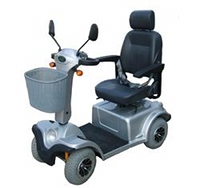
Scooters for elderly allow users to travel to places (stores, friends houses, mail box, etc) that is too far to walk. They can carry groceries, have a rain cover and some can even tow a mini trailer! They can give many elderly their freedom and independence back.
They are battery powered and can be charged over night. They can go forward or reverse and are surprisingly fast, although the speed can be regulated.
They are designed for people with decreased strength, endurance and balance. Seniors often fit in this category. Some seniors give up their driving license and instead use a scooter to do all their "running around".
They are excellent for people who do not like the idea of a wheelchair as scooters do not have the same stigma attached to them.
They are operated with a steering "tiller" with controls for forward, reverse and speed.
Who Should Use?
Elderly who have difficulty walking longer distances but would enjoy going to places such as the mall, seniors centres, family and friends' homes, grocery shopping and other community locations.
Scooters for elderly are excellent for seniors with:
- A secure place to store the scooter such as an underground parking area with an electrical plugin to charge the scooter.
- Live in an area that has sidewalks and/or bicycle lanes that they can use.
- Good vision, hearing and cognitive abilities (such as memory and judgement)
- Physical ability to safely get on/off and operate the scooters for elderly
- Decreased physical condition due to multiple sclerosis, obesity, severe arthritis, respiratory issues such as COPD, and many other chronic health issues
Who Should NOT Use?
Elderly who live in an area with no sidewalks or bicycle lanes and busy roads as there will be no safe area to use the scooter. It is not a replacement for a car but can provide some of the freedom of a car.
Elderly with the following health issues should NOT consider a scooter:
- Cognitive issues such as poor memory and judgement
- Cannot safely get on/off and operate the scooter
- Poor vision and hearing
- Seizure disorders
- Poor balance
Elderly considering scooters for elderly should also have a secure place to store it (underground parking, etc) that has an electrical outlet so they can charge the scooter's battery.
Scooters vs. Motorized Wheelchairs
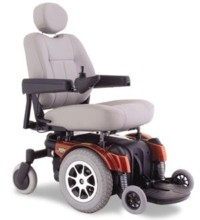
A motorized wheelchair is designed for someone who needs to use the device almost all the time - whether that is indoors or outdoors.
Scooters for elderly are designed for use outside of the senior's home and to travel distances that are out of their "walking range".
Motorized wheelchairs are usually more expensive, operated with a joystick, can allow custom seating for positioning/support and designed for seniors with significant mobility issues.
Motorized wheelchairs are not designed for traveling as long of a distance outdoors as scooters for elderly
Whereas someone needs a fair amount of physical ability to operate a scooter, an motorized wheelchair is operated with a joystick control and can even be modified to operate with more specialized controls such as head or sip and puff (for people with spinal cord injuries)
Types
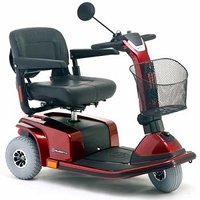
There are a wide variety of scooters for elderly.
Number of Wheels
- Most commonly have three or four wheels
- Four wheeled scooters are more stable - especially to tipping over sideways such as at a curb cutout in a sidewalk
- Three wheeled scooters have a smaller turning radius so they may be preferred for indoor use
Front or Rear Wheel Drive
- Front wheel drive scooters are usually less powerful, have a smaller weight capacity and designed for indoor use
- Rear wheel drive scooters are usually more powerful, have a larger weight capacity and designed for both indoor/outdoor use
Lightweight/Travel Scooters
- These should be considered only for their intended use - short trips, mainly indoors where ground is level and for people of smaller size
- These models are more prone to tipping and should be carefully driven near curb cutouts or other areas that lean the scooter sideways
How Much Do They Cost?
They range from $2000 - $5000, depending on the model.
Accessories can range from $25 (for a safety flag) to several hundred for a trailer (for groceries, etc)
Sometimes extended health insurance will pay for some or all of the costs of scooters for elderly. This may involve an assessment by an occupational therapist, their report/recommendations and a doctor's prescription.
Who Needs to be Assessed/Tested?
If you have funding such as extended medical insurance or even Medicare, then you will need to be assessed by a health care professional (such as a physical or occupational therapist) as well as a doctor's prescription.
There are no laws that I am aware of that prevent you from purchasing an elderly scooter on your own and operating it.
However, I highly recommend having the assessment done to make sure you and the people around you are safe while you drive it.
The assessment can include both screening tests and an "on-road" test.
If the senior passes the screening tests then they continue on with an on road test using a scooter.
Pre-screening includes:
- Vision
- Cognitive test - memory, judgement
- Attention and distractibility
- Problem solving ability
- Hearing
- Basic physical ability - functional strength, balance and range of motion so the senior can transfer on/off the scooter and safely operate
On road test includes:
- Transfer on/off scooter
- Use controls
- Safely operate scooter in variety of areas including: turning, negotiating crosswalks, etc.
- In home assessment
- Awareness of performance and safety
Always take the scooter to your home/neighbourhood and test drive it. Every model has a different turning radius, length, width, ground clearance, etc.
The only way to know it will work for your intended use is to test it out.
Recommended Features
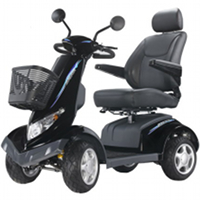
Good scooters for elderly will have:
- Large, easy to read controls - To know the speed and battery levels
- Rear view mirrors - To check for other scooters, pedestrians, vehicles and cyclists
- 4 wheels - Safer as they are less likely to tip over sideways
- Flip up armrests - Which make it easier to get on/off
- Swivel seat - Can help some individuals get on/off the scooter
- Lights and reflective decals - So drivers, pedestrians and cyclists can see you
- Large wheels - 8-10" in diameter make the scooter roll smoother over uneven ground
- Basket - To carry items such as shopping purchases
- Anti tip wheels - Located on the back of the scooter so it does not tip
- Battery range - make sure you have enough range for your intended use
- Warranty - At least 1 year but some have limited lifetime warranties
- Ground clearance - 4" or more if intended to use outside
- Suspension - Especially if the senior is going to use if outside
- One handed operation - Some individuals, especially those with hemiplegia from a stroke - will benefit from buying scooters for elderly that can be operated with one hand
- Canopy - If using outside as it protects from sun and rain
Accessories
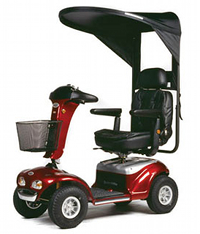
There are many accessories available for scooters for elderly, including:
- Reflective safety vest - To make sure the scooter is seen
- Safety flag - To make sure vehicles can see you even behind parked vehicles or shrubs
- Canopy - To protect from rain and sun
- Covers - To protect from weather conditions while parked
- Baskets - To carry small items
- Trailers - To carry larger items such as groceries
- 4 wheel drive - Especially for seniors living in rural areas with dirt/gravel and inclement weather
- Helmet - To protect the user in case of collision or fall
- Vehicle racks - To carry the scooter on a vehicle
- Ramps - For the home's entrances, door thresholds, and even into vans/trucks
Safe Driving Tips
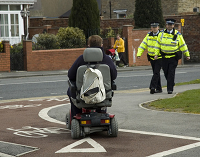
Scooters for elderly should be used carefully as they are operated in areas with pedestrians. They have the power and weight to injure the user and bystanders.
Safe driving includes:
- Practice - Especially before you use it the first time but also whenever there has been a period of time where the seniors has not used it (ex. winter).
- Know the area - Know which route to take so you can ensure there are sidewalks or foot paths
- Be seen - Make eye contact with drivers so you know they are aware you are there. Some drivers are not paying attention and are not expecting a fast scooter to appear in a crosswalk
- Be in control - Do not drive fast in an area with people or in small spaces
- Respect traffic laws - Operate the vehicle as if you are a pedestrian
- Nighttime use - Have lights, reflectors and try to limit your use in the night
- Slow down - Travel at the same speed as pedestrians when approaching intersections, pedestrians, blind corners, etc.
- Sidehills/curb cutouts - Be very careful of areas that lean the scooter sideways as they are at risk of tipping over
- Do not drive off a curb - This will likely damage the scooter and can may tip over causing injury
- Do not carry passengers - They are not designed to carry more than one person
- Turn scooter off when getting on/off - The user can accidentally touch the forward/reverse button causing the scooter to move and causing the user to fall
- Defensive driving - Drive like no one can see you - Drive defensibly and make eye contact with drivers, pedestrians and cyclists so you know they are aware of you
- Crosswalks - Only cross roads at pedestrian crossings
- Stay to sidewalks - Only ride on the road as a last resort - try to stay on sidewalks and footpaths
- Driveways - Watch out for vehicles coming out/entering driveways
- Don't overload - Don't overload the scooter with too many packages as this can make the scooter prone to tipping over (ie. top heavy)
- No sidewalk - If there are no sidewalks, follow advice for pedestrians and travel on the side facing traffic (in North America this would be the left side)
- Passing - When passing pedestrians, give room and use a bell or tell them you would like to pass
- Medications/alcohol - Avoid using the scooter if taking medications or alcohol that can affect your judgement or skills
Return to Mobility Products for the Elderly
Return to Equipment for Seniors
Return to Elderly Care Products
Return to Caring for Aging Parents


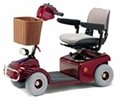



New! Comments
Have your say about what you just read! Leave me a comment in the box below.